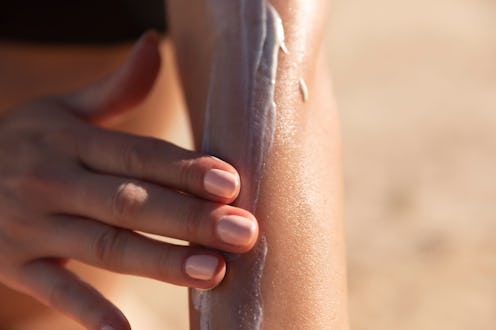Beauty
Here's How Quickly The Sun Can Actually Damage Your Skin
It happens faster than you realize.

With the end of summer looming and fall weather waiting just around the corner, you may be inclined to ditch your SPF until next year. After all, why apply sunscreen when it’s overcast or chilly? As it turns out, slathering on SPF in gloomy weather is one of the 10 important commandments of sunscreen use. (Just ask any dermatologist.) Yup, UV rays won’t let a little cloud action rain on their parade, so it’s crucial to keep protecting your skin as the seasons transition. You can still tan or burn — and it can happen quicker than you might think.
According Dr. Marina Peredo, MD, FAAD, a board-certified dermatologist at Skinfluence in New York City, the amount of time it takes to tan depends on the climate and location (if you live near the equator or high up in the mountains, for example, your skin will be impacted faster because the sun’s rays are stronger there) and the color of your skin. “Those who have darker skin typically tan faster and darker because they have more melanin in their skin,” she tells Bustle. “People with lighter skin tend to burn and not necessarily tan because of a lack of melanin.”
Generally, though, if you’re wearing sunscreen, you can tan within one to two hours, says Peredo. And how long does it take to tan if your complexion isn’t protected? She adds that your skin can darken (or burn) in as little as 10 minutes without SPF, “especially if you have lighter skin.”
Keep in mind that while a radiant glow — especially in the fall and winter — sounds enticing, there’s no such thing as a healthy or safe tan that comes directly from UV rays, says Jordan Cook, a tanning expert for St. Moriz. “Once skin is exposed to UV radiation, it increases the production of melanin to protect the skin from further damage,” she says, adding that the increase in melanin can cause your skin to darken from sun exposure. Ultimately, “tanning damages your skin cells and speeds up visible signs of aging. Worst of all, tanning could lead to skin cancer.”
If you find yourself battling a painful burn or tan, remember to moisturize and take an anti-inflammatory medication such as Advil, suggests Dr. Zenovia Gabriel, MD, board-certified dermatologist and founder of Zena Medical. “My favorite tip is to put Dr. Zenovia Skincare Inflam-Aging Night Repair Treatment on under your sunscreen to help prevent sunburns and the oxidative stress of ultraviolet radiation,” she tells Bustle.
Regardless of how long it takes to tan, dermatologists recommend that you stay protected with an SPF of at least 30 all year round and avoid prolonged sun exposure — in every climate.
Experts:
Dr. Marina Peredo, MD, FAAD, a board-certified dermatologist at Skinfluence
Jordan Cook, tanning expert for St. Moriz
Dr. Zenovia Gabriel, MD, board-certified dermatologist and founder of Zena Medical